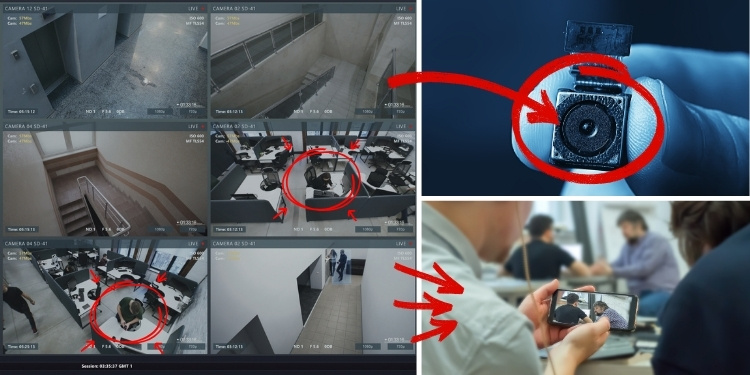One day, you’re just going along minding your own business, then you open the mailbox and find a letter from the IRS. Just seeing the words Internal Revenue Service can make your heart pound in your ears. As they’re a government organization that doesn’t knock politely.
If they think you owe them, they won’t hesitate to slap you hard with penalties, liens, and even wage garnishments. And because nowadays self-sufficiency is king, losing access to your income or property can cripple your survival chances.
This is one of those times when an ounce of prevention is better than a pound of cure. So, I thought I’d take a closer look at what to watch for, and how to stay off the IRS’s radar.
How the IRS Works and Why You Should Care

As most people know, the IRS is the federal agency responsible for collecting taxes and enforcing tax laws. This institution runs one of the most sophisticated data networks in the world, tracking every red cent that moves through the US economy.
Every W-2, 1099, bank report, crypto sale, private freelance payment, and even PayPal transaction can be tracked and cross-referenced through their system.
If you think your side hustle, barter deal, or crypto stash went unnoticed, think again. They’ve got it all tallied and collated in their system in one form or another. After all, this is their job, and there is no consequence to them for overdoing it!
Still, the IRS doesn’t audit people and businesses at random. Their system uses something called the Discriminant Information Function or “DIF” score. Their algorithm then determines if it’s worth their time to audit someone or simply send them a threatening letter.
It’s an algorithm that flags returns with unusual patterns. It looks for things like:
- Large deductions relative to income.
- Frequent losses from small businesses.
- Mismatched 1099s or W-2s.
- Inconsistencies with past returns.
- Unreported crypto or foreign income.
If your DIF score reaches a predetermined degree, they will flag you for audit. Moreover, if they notice a discrepancy, where you might have made a mistake, they’ll send you a threatening letter first to give you the chance to fix it.
 But things weren’t always this way. The IRS was founded in 1862, during the Civil War, as a way to fund the Union through income taxes. Over time, it grew into the massive institution we know today. But during the Great Depression, things were done differently.
But things weren’t always this way. The IRS was founded in 1862, during the Civil War, as a way to fund the Union through income taxes. Over time, it grew into the massive institution we know today. But during the Great Depression, things were done differently.
People didn’t rely on government programs or credit cards to get by. Cash was scarce, so ordinary Americans had to learn the hard way how to stretch every dollar and live within their means.
As bleak as that era was, it taught hard but valuable lessons about financial resilience and self-sufficiency. The book Efficient Survival Strategies from Real People Who Made It Through the Great Depression shares the practical wisdom that helped ordinary Americans endure those difficult years. The same insights could help you find stability and confidence in today’s uncertain economy.
What Happens If You Get a Letter from the IRS
Let’s say you or your DIY tax software program make an honest mistake. For instance, if you mistakenly claim a dependent or fail to report income earned in another state, the IRS may identify those discrepancies during a review. Even though someone might have given you cash for a side gig you did, they might have claimed it on their books and reported it to the IRS.
In most of these cases, the IRS will send you a letter or a CP2000 Notice that says something like: “We understand that mistakes happen, but according to our records, you made an error.”
They typically include instructions for how to clear it up, or what documents are acceptable to prove you weren’t wrong. Then they’ll usually give you 30 days to respond.
⇒ How to Defeat Procrastination in Just 10 Minutes and Start Making Money Now
If you send them the correct documents or file the amended return in that window of time, it typically won’t trigger an audit. However, the IRS will still continue accruing interest penalty payments on what they think you owe, even during that 30-day window! They might give you a number to call or an office to communicate with, but in my experience, this is useless. You get an automated response that just wastes time, and the 30-day clock on interest penalties just keeps ticking.
How Does the IRS Penalty Interest Work?
When you receive a CP2000 notice from the IRS, even if the discrepancy is minor, the IRS may assess additional tax and interest penalties. Interest is calculated from the original due date of the return, which is usually April 15, and keeps adding up daily until the balance is paid in full.
Adding insult to injury, the interest rate is adjusted quarterly and compounds daily. While a small error might not seem significant, the IRS treats all underpayments seriously and applies interest automatically, regardless of whether the mistake was accidental or due to willful negligence.

So, it’s not that they just want you to pay the original amount. The way they see it, they’ve got you in a vice and they’re happy to milk you for every penny they can get out of you, for every day that you don’t comply. Yet even if you’re right, they’ll just send you a letter saying “Thank you for clarifying this matter” with no compensation for all the time you wasted jumping through red tape hoops.
If you’re wrong and pay up promptly, you’ll still likely get a second bill for the additional days it might have taken for mail delivery and processing. Trust me, they don’t miss an opportunity to pump you for every last red cent they can!
Ignoring the notice or delaying payment can result in additional penalties, such as the accuracy-related penalty, which is typically 20% of the underpayment. Responding quickly and accurately can help minimize or even eliminate some of these charges.
What Happens If They Come After You with an Audit Notice
If the IRS flags you for an audit, due to a major discrepancy, the situation can escalate fast. If you get a letter, always respond as soon as possible. Ignoring IRS letters is like throwing gasoline on a fire. My advice is to look for any optional outs they give you.
This might include things like:
- Providing paperwork.
- Filing an amended return with the corrected difference.
- An assessed payment amount.
So, if IRS has you locked in its cross-hairs, you’re not imagining it. The reality is that the IRS doesn’t just show up by surprise: it acts when the system catches up with you. The best defense? Gain economic literacy and understand how money flows, how government revenue works, and how your taxes fit into the bigger financial picture.
What If You Have Audit Defense?
If you have audit defense through a software package you upgraded, or a CPA did your taxes, you should immediately contact them. These programs vary, but most will represent you and they will do most of the dealing with the IRS for you.
Related: Death Of The Dollar
It might even be their error, and the software defense program or the CPA will handle the liability! In any case, this is rare and often flies in the face of what they originally promised you when you signed up for audit defense.
Even if you know you’re wrong and you didn’t supply the CPA or the software with the correct information, they can help. They’ll usually represent you for a small fee, which is usually much less stressful than trying to take on the IRS alone.
What a Full Audit Entails
In the situation you are being flagged for a full audit without any sort of out clause, you’re in for some serious stress. Audits are extremely thorough and unforgiving.
They might ask for receipts, bank statements, and explanations. All documentation needs to be professionally supplied and verifiable.
You’ll be forced to pay penalties and interest, which is compounded daily. Failure to file or pay your underpayment penalties can stack up quickly.

If you absolutely refuse to pay, the IRS has the power to apply liens and levies on your home or garnish wages from your job, pension, or even Social Security. This usually happens after a prolonged period of time, and accounts for every penny of owed interest. Meaning they won’t just take what they think they were originally owed. They’ll take property and seize wages for the added interest and penalty fees as well!
Worse yet? If they suspect fraud or intentional tax evasion, it becomes a criminal case. Your refusal to communicate, even if you just got stuck in a phone message system, will be seen as an act of defiance.
I would also note that criminal tax evasion is considered a federal crime. Meaning they rarely ever plea bargain. If jail time is applied, you’ll have to do your time in a federal prison, where your chances of parole are extremely low.
Tips for Staying Off the IRS Radar
Staying off the IRS radar starts with keeping everything above board. However, there are strategies that will keep your DIF score as low as possible.
File On Time, Every Time
Even if you owe nothing make sure to file your taxes on time. Not filing is one of the fastest ways to get flagged. If you can’t pay what you owe at that time, file anyway and request a payment plan.
Document Everything
Receipts, logs, income sources, keep it all and keep it straight. Especially for cash jobs that pay more than $600, online income, and crypto trades. The more records you have, the less vulnerable you are.
Be Careful with Deductions
Yes, you can deduct home office space, solar panels, and even emergency supplies if they relate to your business. However, overdoing it can trigger audits. Only claim what you can back up and be modest about it.
I knew a guy who loved to donate things to a certain charitable organization, which I won’t name. That organization let him write out a receipt for what the value was of what he donated to a maximum of $300. When his parents died, he started donating their stuff in daily batches. He’d donate a kitchen table on Tuesday and write it up as being worth $300. A ratty old couch on Wednesday, which he claimed was worth $400.
Dollar Apocalypse: Survival Guide for the Next Great Depression by Claude Davis and economist David Bates breaks it down in plain language, showing you how debt spirals form, and what steps you can take to protect what’s yours. So, if you’re serious about staying one step ahead of the system, rather than simply reacting, you’ll want to pick up this book now, before it’s too late.
After a dozen or so donations, he thought he’d knocked a lot off his tax bill. What he didn’t realize was that each one of those maximum donation receipts with all its gray area was gradually raising his DIF score, until it triggered a full-on massive audit!
Keep Business and Personal Finances Separate
Separate accounts for anything that resembles a business. Mixing funds makes audits harder to navigate and more suspicious.
Be Mindful with Crypto and Barter
The IRS now asks every taxpayer if they’ve transacted in crypto. Assume they know. They also consider bartering to have taxable value. If you trade gold for carpentry, technically, you owe tax on fair market value.
But hear me out – there’s a way to escape tax hell and that is by taking control of your income! Becoming your own boss and building multiple streams of passive income can give you the freedom most people only dream about.
But here’s the truth – financial freedom starts from the inside. You need resilience, discipline, and a winning mindset to make it last. That’s why The True Grit Academy was created – a course built for men who refuse to quit, who want to sharpen their mindset, and who are ready to take full responsibility for their success.
Final Thoughts: Take the IRS Seriously!
The IRS has the full backing and power of the Federal Government, and they don’t hesitate to use it. Modern algorithms make it easier than ever for them to flag you, and automation leaves you to pay the bill to a faceless entity.
When your business isn’t on the IRS’s radar, be smart about keeping it that way by filing your taxes on time, accurately, and consistently. Should you receive a letter from the IRS offering options to avoid an audit, take those options seriously and act promptly. But if you’re already facing a full audit, contact a tax professional immediately or activate your IRS audit defense program. It’s always better to have experts dealing with the IRS than to try handling it on your own.
👉Do you think IRS should be reformed? Tell us your opinion in the comment section below!
You may also like:
 You’ll Wish You Had This After the Dollar Dies
You’ll Wish You Had This After the Dollar Dies
How to Get Hot Running Water For Free (VIDEO)
Facing Starvation: How This Economic Crisis Threatens Americans





















O’ so scary.
When you steal from people, by way of taxes thru means as they have used.
Then they will pay just like all tax collectors have in the passed., “judged harshly”, by GOD.
All .gov is very evil within the people and all that it is.
Funny my GOD will audit ALL .gov agencies and they will pay not with money BUTT with there soul’s.
O’ and my GOD will collect what is owed to him,, every last cent…
stay sharp
PS: DONT fear the IRS or any other .gov agency…
(“BETTER FEAR GOD”)….
Most of the time the IRS will not cite the law they are using to send threatening letters. When you get a Notice that begins with “We have determined…. or some such, cite IRS Pub #1 and ask for clarification of their “determination” by citing to you the law they think they are following. They have never sent me the “law,” the Title 26 Section they think they are using because it often does not exist. They will continue to harass you at least once a year, just respond requesting they cite the law. They don’t when they don’t have a law, just threats.
We need to adopt the Fair Tax! It simplifies all and does away with tax returns and the IRS!
10% FLAT TAX IS THE ONLY WAY!!!!
A flat 10% tax definitely has appeal. Whether it’s realistic is another question, since the government would have to make major budget adjustments or find new revenue to make a rate that low work. Still, it’s a strong viewpoint that keeps the tax-reform discussion moving. Thanks for weighing in!
Have to repeal the amendment that created income tax first. No one in congress is going to support that. Otherwise we get taxed twice. Be careful what you wish for
Any major change like the Fair Tax would definitely require big structural steps, that including dealing with the income tax amendment. Without that, double-taxation would be a real concern. It’s an important reminder that big ideas come with big complexities.
Have to repeal the amendment that created income tax first. No one in congress is going to support that. Otherwise we get taxed twice. Be careful what you wish for
The Fair Tax does appeal to a lot of people because it promises a much simpler system. No annual tax returns. Less paperwork and fewer compliance costs. Supporters also like that it makes taxes more transparent since everything is collected at the point of purchase. I appreciate you adding to the discussion!
if they are after you,
Step 1 change your voter registration to Liberal, marxist, or even just to democrat.
Step 2 legally change your last name to clinton, obama, biden, pelosi, harris, newsome etc
step 3 relax and wait for the apologue letter to come in the mail
THE + IRS = THEIRS